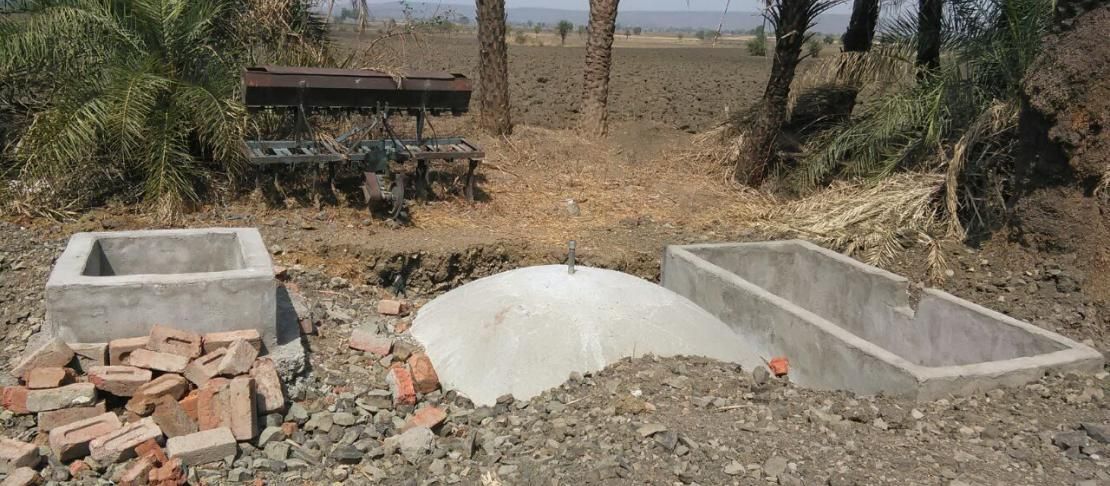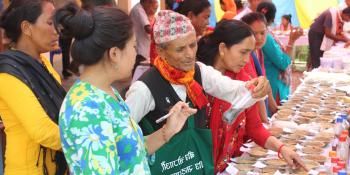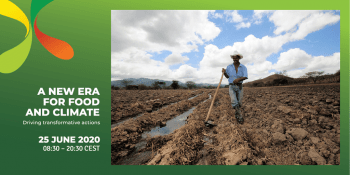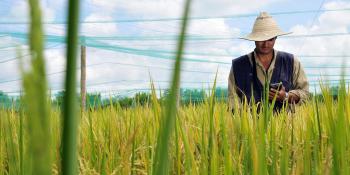Crafting Climate-Smart Villages at the ‘Heart of India’

Private sector partnership helps scale out Climate-Smart Villages in India.
The second largest Indian state by area size, Madhya Pradesh, has been a major contributor to the nation’s natural resource base and cultural heritage. Agriculture still remains a core area of the state’s economy which is highly dependent on the monsoonal rains it receives. Like many other states in the Indian subcontinent, Madhya Pradesh too has been suffering on account of the effects of the changing climate and has in the recent past witnessed detrimental impacts on its agricultural system and productivity.
Locally contextualized soultions
The current climate risks observed in Madhya Pradesh include rainfall variability, droughts and waterlogging due to heavy downpours. While the future risks projected are those of average surface daily maximum temperature rise between 1.8-2.0° C by 2030, as well as heightened variability in rainfall patterns like decline in winter rainfall on one hand and increase in monsoonal rains on the other. It has been assessed that agricultural production in the state will be visibly hard hit by climate variability, particularly seasonal and inter-annual variability in rainfall leading to long dry spells, droughts, water congestion and floods. The ongoing changes have already led to slumped production in two of the state’s major crops, soybean and wheat. Further, heat waves during crop ripening stage and cold waves during rabi season will only exacerbate the negative impacts of climate-induced changes. Warmer temperatures, in particular, are slated to significantly impact over all crop growth and reproduction.
To help the state mitigate such climate associated risks in agriculture, ITC Limited, a leading multi-business enterprise has partnered with the CGIAR Program on Climate Change, Agriculture and Food Security (CCAFS) to devise scalable strategies to bring about climate-smartness in the state’s agriculture system in three states, i.e. Madhya Pradesh, Maharashtra and Rajasthan. The venture is being implemented by ITC along with its civil society partners through the Climate-Smart Village (CSV) approach which promotes the identified sites as multi-stakeholder learning platforms for testing technological and institutional options to build resilience. This collaboration emerges from the understanding that for such private entities, issues confronted in the agricultural space is integrated with their value chain, thereby, impinging on their sustainability.
ITC Limited has been actively engaged in ameliorating the conditions of the farming communities in its outreach areas through initiatives such as rural capacity building in partnership with local communities to develop water and forest resources, creating non-farm livelihood opportunities, skill development, as well as women’s economic empowerment. In continuation of such efforts and with knowledge inputs from CCAFS, this joint venture has been created to further address the growing challenges posed by climate change on current, as well as future food security in ITC outreach areas.
Roadmap to a resilient future
Under phase one for the implementation of the CSV approach in the key areas, this joint project has envisioned:
- creation of a roadmap for each cluster of villages that will act as a tool for communities in assessing the progress and alignment towards CSVs,
- participatory implementation of various climate-smart interventions to promote CSVs in on-going projects of ITC, and
- strengthening the capacity of farmers, local bodies and other stakeholders in climate change adaptation and mitigation.
There are multiple climate-smart agriculture (CSA) interventions being implemented at ITC-CCAFS project sites at present. Nearly 47% of the land is irrigated and villages are well equipped with large volume rainwater harvesting structures like ponds, check-dams and tanks. For water management, farmers are also implementing sprinkler and broad bed and furrow, which help to strengthen resilience via increased water use efficiency. The integration of villages with ICT service is exemplary, as roughly 50% of population is receiving on time delivery of information crucial for efficient farming practices. Some of the other important on ground interventions include integrated nutrient management, agroforestry and in-situ soil moisture conservation. There are varied social groups which have facilitated easier implementation of CSA interventions. A total of 117 farmers’ groups, 351 water user groups and 328 Self Help Groups are functioning in the project sites.
However, some challenges remain to be addressed. Though farmers, as a preventive measure, sow improved short duration varieties of crops, the scale of adoption is not wide. Similarly, insurance is also sparsely prevalent. ITC-CCAFS-CSV program in Madhya Pradesh targets to scale out interventions addressing these challenges along with other activities with the larger aim of building resilient communities while insulating food production from the adverse impacts of the changing climate.
Read more:
- Blog: Private sector involvement in building climate change resilient agricultural production system in India
- Brochure: Climate-Smart Villages An AR4D approach to scale up climate-smart agriculture
Kunal Pandey is the Project Coordinator at CCAFS South Asia.
Anjali Pant is a Research Assistant at CCAFS South Asia.



